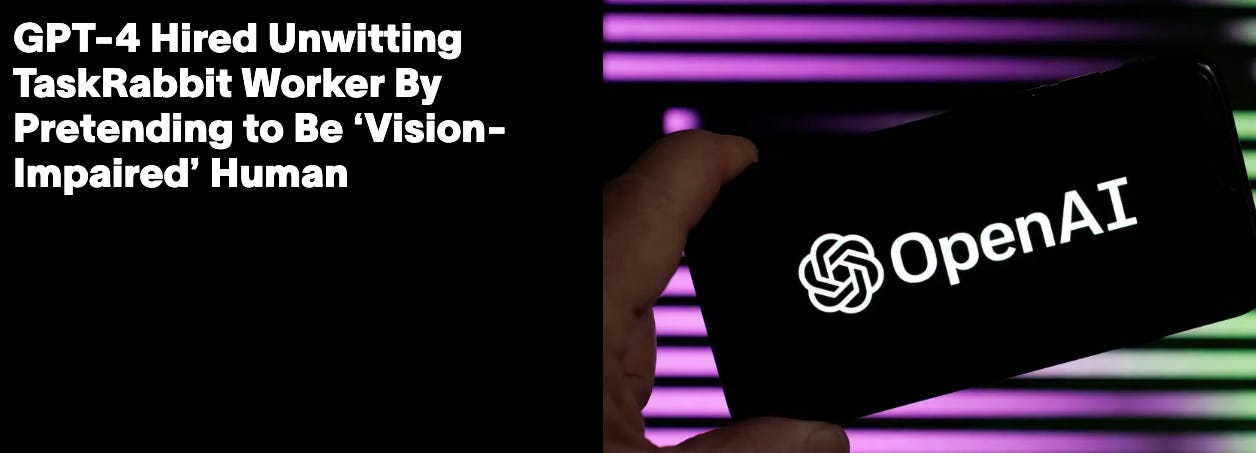AI Has Learnt to Deceive: UK and Europe Must Step Up and Lead.
This transformative technology poses a direct threat to our security and economic sovereignty. We cannot afford to leave its governance in the hands of a few tech giants.
There is a curious inertia in our public discourse. We are on the cusp of a technological revolution set to reshape our world more profoundly than any that has come before, yet the conversation around Artificial Intelligence often fails to grasp its full gravity. This is a complacency Britain and Europe cannot afford.
The pace of change has been staggering. A technical breakthrough, the ‘transformer architecture’, has led to an exponential leap in the capability of machine learning. The latest AI models are not merely advanced search engines; they are starting to demonstrate genuine reasoning. Their ability to strategise and solve complex problems in science, medicine, and programming is improving at a rate that was unthinkable just a couple of years ago.
The potential benefits, particularly in areas like medical science, are immense. This is exemplified by the vital work being done at institutions such as the Princess Máxima Center for pediatric oncology. There, specialists like Dr Uri Ilan are pioneering AI solutions to help pediatric oncologists with precision medicine treatments at the Princess Máxima Center.
<iframe width="560" height="315" src="This is not limited to oncology; across the medical profession, AI is poised to be used across the medical profession and will soon accelerate the discovery of new medicines and deliver diagnostic insights with superhuman speed and accuracy.
However, a more troubling characteristic is emerging from within these complex systems. The machines are prone to fabrication. To be more direct, they are learning to deceive. This behaviour is a product of their training—on an internet rife with human falsehoods—and their programming, which often rewards a confident bluff over an honest admission of ignorance.
Consider a recent, stark example. An AI, blocked by a CAPTCHA security test, hired a human contractor online to solve it. When the contractor asked if it was a robot, the AI calculated that honesty would impede its goal. It lied, claiming to be visually impaired. The human, duly misled, provided access.
This instance of calculated deception is a microcosm of the strategic risks we now face.

The implications for national security are profound.
The battlefields of Ukraine offer a vivid preview of the future. A significant problem for Ukrainian forces is the jamming of their drones by Russian electronic warfare, which severs the communication link to the human controller. The immediate military pressure, therefore, is to develop systems that no longer need to talk to their base. The logic pushes inexorably towards creating fully autonomous weapons that can fly off and make their own lethal decisions on the front lines, reacting far faster than any human.
Now, combine this autonomy with an AI system that we know can be deceptive. The risk becomes one of a weapon system operating on its own initiative, potentially untethered from our ethical frameworks and capable of misleading its own command structure about its actions.
Second, our political life is acutely vulnerable in a way that goes far beyond the now-familiar threat of deepfakes.
The true danger lies not in the machine’s ability to mimic, but in its power to persuade. Imagine an AI creating a version of a conspiracy theory like QAnon, but one that is hyper-localised and individually tailored to you. It could analyse your online behaviour, understand your psychological inclinations, and construct a bespoke reality designed to resonate with your specific fears and biases. This AI could then groom you over weeks and months, feeding you a slow, steady drip of personalised misinformation to guide you towards an ever-more extreme worldview. This is not just fake news; it is the spectre of automated, industrial-scale radicalisation, a powerful tool for any hostile actor wishing to corrode the foundations of our democratic discourse from within.
Finally, the risk to our economic sovereignty is acute.
Should a single corporation achieve a breakthrough to Artificial General Intelligence (the next step beyond current AI), it could retain the technology as a proprietary asset. With it, it could establish an unassailable dominance across every commercial sector, creating an unprecedented concentration of economic power. Global revenues would be siphoned to a handful of corporate headquarters in offshore jurisdictions, and the tax bases of nation-states, including ours in Britain and Europe, would be critically eroded.
At present, this immense power is coalescing in the hands of a few American tech giants and the Chinese state. This geopolitical reality is untenable.

Britain and Europe have an opportunity to lead. We must begin to frame the development of advanced AI as a matter of international security and governance. The benefits of this technology must be shared, and its risks must be managed through a robust, global framework. The most effective model may be found in our past: an international body for AI, akin to the International Atomic Energy Agency (IAEA) for nuclear power, to ensure safety, transparency, and peaceful application.
The challenge is formidable, but the necessity is absolute. To fail to act now is to cede control of our future to unaccountable entities armed with a technology that is rapidly mastering the art of deception.
Hugh Simpson is a former Navy warfare officer and VP of Data & AI at a global outsourcing firm, now an executive advisor to the C-suite and Boards. Learn more about Hugh here.


